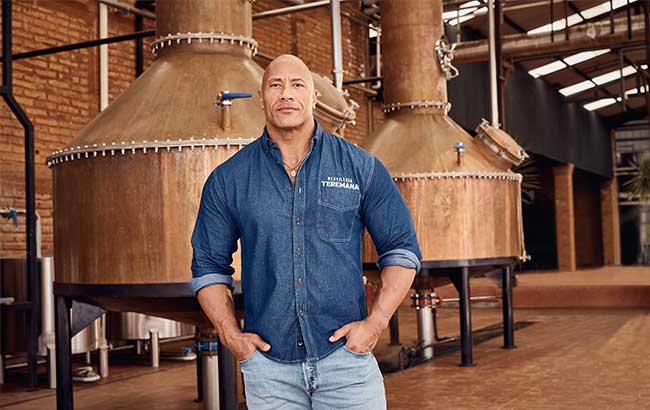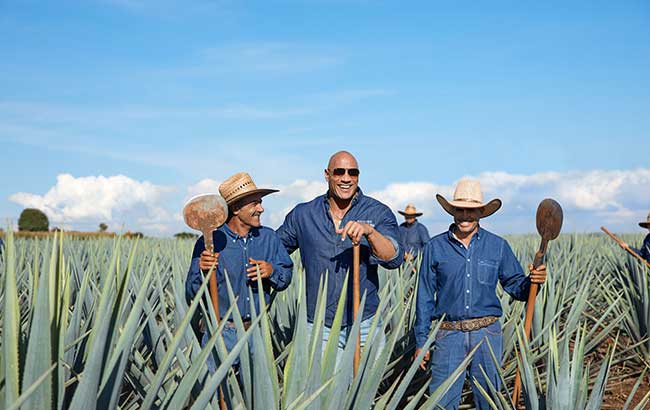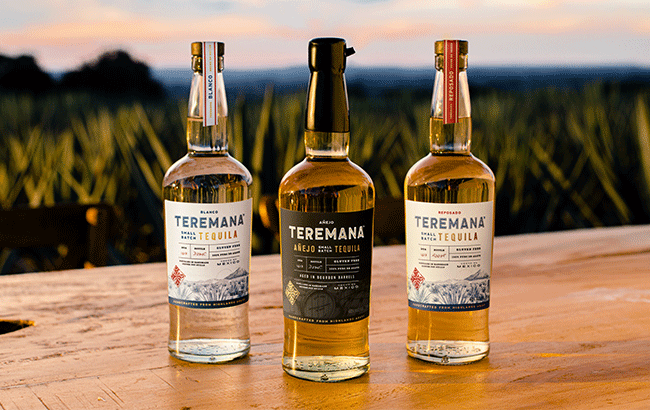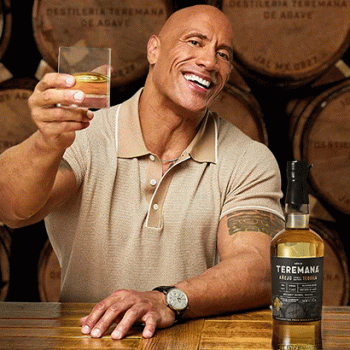The big interview: Dwayne ‘The Rock’ Johnson, Teremana Tequila
By Kate MalczewskiWhile some celebrities’ associations with spirits brands seem like marketing exercises, actor Dwayne ‘The Rock’ Johnson has built Teremana Tequila from the ground up. We caught up with him to discuss his approach to agave spirits and what’s in store for the brand.

Though Dwayne ‘The Rock’ Johnson body‐slammed his way into the public sphere in the ’90s as a professional wrestler and became a household name as the star of big‐budget, family‐friendly films such as Jumanji and Jungle Cruise, his Instagram bio – that all‐important signpost of identity in the age of social media – simply reads ‘founder’.
“I’m a serial entrepreneur,” Johnson explains over email. And he has the track record to prove it: he started the media production company Seven Bucks with producer Dany Garcia, his ex‐wife; he’s a part‐owner of the American football league XFL; and he co‐created the energy drink Zoa, in which Molson Coors has a minority stake.
In March 2020, he extended that entrepreneurial empire to the spirits industry with the launch of Teremana Tequila. To found the brand, Johnson once again partnered with Garcia, and also tapped Jenna Fagnan and Ken Austin, veterans of the sector who helped to build Tequila Avión, which was acquired by Pernod Ricard in 2018.
Teremana is a passion project for Johnson, who says his family and friends have enjoyed Tequila for years “in the good times, the not-so‐good times and everything in between”. The brand’s name encompasses the Polynesian word ‘mana’, meaning ‘spirit’, as a nod to Johnson’s heritage, and he has added personal touches to Teremana’s packaging design: the bottom of each bottle is embossed with ‘Tijasi’, a combination of the first two letters from the names of his three daughters – Tiana, Jasmine and Simone.
His love for Tequila and connection to the brand means he has been involved with production since “day one”. “It’s how I operate, and I insisted on being there every step of the way in the liquid’s development,” he says, noting that his team went through 113 distillations before landing on the final recipe. “I insisted on such participation because it’s the only way to truly learn the process from beginning to end. I needed to educate myself.”

‘The big trifecta’
To create the range, the co‐founders teamed up with the Lopez family, who have been growing agave and making Tequila for decades at their distillery in Jesús María, Jalisco, Mexico. Through the partnership, the family became co‐owners of the brand, and a distillery was purpose‐built for Teremana on the grounds of their larger facility.
During the Tequila’s development, Johnson was aiming to achieve “the big trifecta”: “taste, quality and affordability”. The brand adheres to a ‘small‐batch’ ethos, as he explains: “The team uses only one process, and everything involved in the production process is made there, including brick ovens, copper pot stills, open fermentation tanks – and, of course, the Tequila.
“We harvest only fully mature agave, slow roast in old‐world brick ovens, and distil in small [3,800‐litre] handmade copper pot stills to bring out rich, flavourful Tequila that reflects the earth it comes from.”
Teremana’s first two expressions, blanco and reposado bottlings, rolled out in the US in March 2020, just as the first wave of Covid‐19 hit the country. The timing presented some significant roadblocks for the brand. “The early challenge was having to reshape consumer behaviour in the midst of a global pandemic,” says Johnson. “During crisis, a consumer will always go for the product that they’re familiar with and makes them feel safe and good.
“Teremana Tequila was the brand new Tequila on the block that no one had ever heard of, other than consumer sentiment of ‘oh, I think that’s The Rock’s Tequila’.”

Fortunately, being known as ‘The Rock’s Tequila’ made for a pretty strong start. In December 2020, after less than one year in business, the brand reported that it was on track to sell about 300,000 cases, and its 2021 sales have topped 600,000 cases – feats that Johnson and his team are “all quite proud of”.
“I was slowly but surely able to pierce consumers’ purchasing habits and have them take a chance on our Tequila,” he says. “I always felt I just needed one chance to convince the consumer that our liquid is great, and you’ll have a real experience drinking it.”
Johnson isn’t shy about harnessing his public presence to market the brand. He regularly posts about Teremana on his Instagram, which boasts more than 280 million followers, and has fronted several Teremana advertising campaigns, including the launch of a branded tour bus that’s been travelling the US giving away Tequila cocktails. He also secured product placement for the Tequila in his recent film, Red Notice.
Celebrity spirits
Johnson’s endorsements could prove valuable indeed, if the short history of celebrity‐backed Tequila is anything to go by. In 2017, spirits giant Diageo snapped up Casamigos, the brand co‐founded by actor George Clooney, in a deal worth up to US$1 billion. Since the acquisition, Tequila has firmly become the spirit of choice for celebrities looking to distil their star power into a profitable business venture – a development that has, in some ways, benefited the category. The rise of celebrity-backed Tequila has attracted a multitude of new drinkers to agave spirits and stirred interest in big‐name brands and independent producers alike.
But the trend has also highlighted serious issues in the category around the transparency, sustainability and quality of celebrity‐supported brands. Many are produced at the same super‐sized facilities, potentially resulting in spirits with few distinctive characteristics. Some of the liquids are made using diffusers – machines that speed up production – a method that is often criticised for its prioritisation of efficiency and quantity over quality and environmental concerns. These practices, and others, impact the Mexican communities that grow agave and make Tequila, but their effects often go overlooked in the shadow of high‐profile marketing campaigns.

For Johnson, the key to approaching the category with integrity is twofold. The first crucial element is the team behind the brand. “To start, I think if one is considering a business in Tequila, it’s important you partner with people in Mexico who care deeply about things on a local, personal and generational level,” he says.
The second aspect concerns production. “I admit, I do move with rapidity and pace [as an entrepreneur], but when it comes to our spirits business, I’m experienced enough now to know I take my time and create respect for the process. Do it the right way, the old‐school way,” he says, adding that Teremana does not use diffusers.
“The business acumen and economics will all come into play and have a tendency to always work themselves out. But it’s defining your purpose in the business that will pave the road for either the fast buck, fast failure, or how you’re creating real legacy.”
Johnson has never been one to do things by halves. His commitment to professional wrestling resulted in 10 heavyweight championships; his hours spent on film sets have made him one of the highest‐paid actors in Hollywood. His ambitions for his spirits company’s future are just as lofty. “I want to build Teremana into a true international Tequila brand,” he says.
He’s well on his way to making it happen. The brand inked a distribution deal with Mast‐Jägermeister before it launched, and in March 2021 it debuted in Canada. In November 2021, Teremana added an añejo bottling to its range. With this momentum in the North American market, Mast‐Jägermeister is now “poised to begin [Teremana’s] international rollout”, Johnson reveals. “It’s a very exciting time for our companies,” he says. “But to win, we gotta stay focused, hungry and humble.”
Related news
Rising star: how Mathilde Rougé became Bartender of the Year
